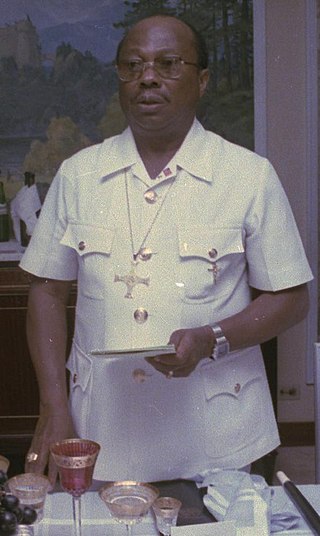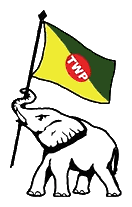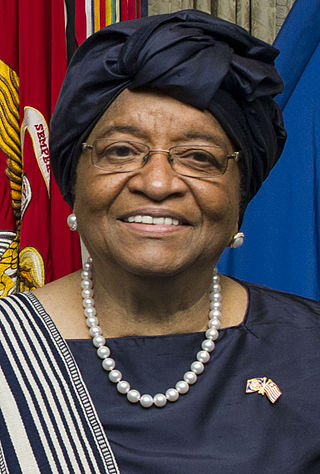
Liberia is a country in West Africa founded by free people of color from the United States. The emigration of African Americans, both freeborn and recently emancipated, was funded and organized by the American Colonization Society (ACS). The mortality rate of these settlers was the highest among settlements reported with modern recordkeeping. Of the 4,571 emigrants who arrived in Liberia between 1820 and 1843, only 1,819 survived (39.8%).

The Politics of Liberia takes place in a framework of a presidential representative democratic republic modeled on the government of the United States, whereby the President is the head of state and head of government; unlike the United States, however, Liberia is a unitary state as opposed to a federation and has a pluriform multi-party system rather than the two-party system that characterizes US politics. Executive power is exercised by the government. Legislative power is vested in both the government and the two chambers of the legislature.

Samuel Kanyon Doe was a Liberian politician who served as the 21st President of Liberia from 1986 to 1990. He ruled Liberia as Chairman of the People's Redemption Council (PRC) from 1980 to 1986 and then as president from 1986 to 1990.
Prince Yormie Johnson is a Liberian politician who has served as a senator for Nimba County since 2006. A former rebel leader, Johnson played a prominent role in the First Liberian Civil War.

The president of the Republic of Liberia is the head of state and government of Liberia. The president serves as the leader of the executive branch and as commander-in-chief of the Armed Forces of Liberia.

William Richard Tolbert Jr. was a Liberian politician who served as the 20th president of Liberia from 1971 until his assassination in 1980.

The True Whig Party (TWP), also known as the Liberian Whig Party (LWP), is the oldest political party in Liberia and one of the oldest parties in Africa. Founded in 1869 by primarily darker-skinned Americo-Liberians in rural areas, its historic rival was the Republican Party. Following the decline of the latter, it dominated Liberian politics from 1878 until 1980. The nation was virtually governed as a one-party state under the TWP, although opposition parties were never outlawed.

The People's Redemption Council (PRC) was a governmental body that ruled Liberia during the early 1980s. It was established after the 1980 Liberian coup d'état wherein Samuel Doe seized power on 12 April 1980. The Council, with Doe as its chairman, promised a complete overhaul of Liberia's society, economy, and political system and the replacement of the corruption of previous regimes with respect for the rights of the Liberian people. The PRC had 17 founding members and was later expanded to 28. The PRC initially functioned as the executive and legislative body in Doe's government. However, over time Doe consolidated power as a central executive. In 1984, the PRC was dissolved and replaced by the Interim National Assembly.

The First Liberian Civil War was the first of two civil wars within the West African nation of Liberia. It lasted from 1989 to 1997. President Samuel Doe established a regime in 1980 but totalitarianism and corruption led to unpopularity and the withdrawal of the support of the United States by the late 1980s. The National Patriotic Front of Liberia (NPFL) led by Charles Taylor invaded Liberia from the Ivory Coast to overthrow Doe in December 1989 and gained control over most of the country within a year. Doe was captured and executed by the Independent National Patriotic Front of Liberia (INPFL), a splinter faction of the NPFL led by Prince Johnson, in September 1990. The NPFL and INPFL fought each other for control of the capital city, Monrovia and against the Armed Forces of Liberia and pro-Doe United Liberation Movement of Liberia for Democracy. Peace negotiations and foreign involvement led to a ceasefire in 1995 but fighting continued until a peace agreement between the main factions occurred in August 1996. Taylor was elected President of Liberia following the 1997 Liberian general election and entered office in August of the same year.
The Liberian Action Party was a political party in Liberia.

The Unity Party (UP) is a political party in Liberia that was started in 1984 by Edward B. Kesselly, also its first standard bearer. Officially founded in Buchanan, Grand Bassa County, the party was established on 27 July 1985. The Unity Party participated in the first elections after the 1980 coup, running against President Samuel Doe in October 1985. The party has remained active in Liberian politics since and is the current ruling party following the 2023 Liberian general election.
Thomas Gankama-Quiwonkpa was a Liberian military officer who was a Commanding General of the Armed Forces of Liberia (AFL).

General elections were held in Liberia on 19 July 1997 as part of the 1996 peace agreement ending the First Liberian Civil War. The presidency, as well as all seats in the House of Representatives and the Senate were up for election. Voter turnout was around 89%. Former rebel leader Charles Taylor and his National Patriotic Party (NPP) won the election with 75.3% of the vote, giving it about three-quarters of the legislative seats according to the proportional representation system. Taylor was inaugurated as president on 2 August 1997.
The National Patriotic Front of Liberia (NPFL) was a Liberian rebel group that initiated and participated in the First Liberian Civil War from 24 December 1989 – 2 August 1997. The NPFL emerged out of rising ethnic tensions and civil unrest due to the Liberian government that was characterized by totalitarianism, corruption, and favoritism towards ethnic Krahns. The NPFL invaded Liberia through Ivory Coast’s border with Nimba County in Liberia under the direction of Charles Taylor, a former Liberian politician and guerrilla leader who served as the 22nd president of Liberia from 2 August 1997 until his resignation on 11 August 2003.

Ellen Johnson Sirleaf is a Liberian politician who served as the 24th president of Liberia from 2006 to 2018. Sirleaf was the first elected female head of state in Africa.

The Constitution of Liberia is the supreme law of the Republic of Liberia. The current constitution, which came into force on 6 January 1986, replaced the Liberian Constitution of 1847, which had been in force since the independence of Liberia. Much like the 1847 Constitution, the Constitution creates a system of government heavily modeled on the Federal Government of the United States.
The Progressive Alliance of Liberia (PAL) was an opposition political movement formed in 1975 in Liberia led by group of Liberians from the United States and local students. The Political Education Team of the organization was organized, prepared, and awarded certificates by and under the signature of the founding Chairman of PAL, Gabriel Baccus Matthews. Members of the Political Education Team of six young Liberian students were:

In April 1961, Sierra Leone became politically independent of Great Britain. It retained a parliamentary system of government and was a member of the British Commonwealth of Nations. The Sierra Leone People's Party (SLPP), led by Sir Milton Margai were victorious in the first general election under universal adult franchise in May 1962. Upon Sir Milton's death in 1964, his half-brother, Sir Albert Margai, succeeded him as Prime Minister. Sir Albert attempted to establish a one-party state had the ready cooperation of the opposition All People' Congress but met fierce resistance from some cadre within his party Sierra Leone People's Party (SLPP) and ultimately abandoned the idea.
Jackson Fiah Doe was a Liberian politician in the late twentieth century.

The 1980 Liberian coup d'état happened on April 12, 1980, when President William Tolbert was overthrown and murdered in a violent coup. The coup was staged by an indigenous Liberian faction of the Armed Forces of Liberia (AFL) under the command of Master Sergeant Samuel Doe. Following a period of transition, Doe ruled Liberia throughout the 1980s until his murder in 1990 during the First Liberian Civil War.

















